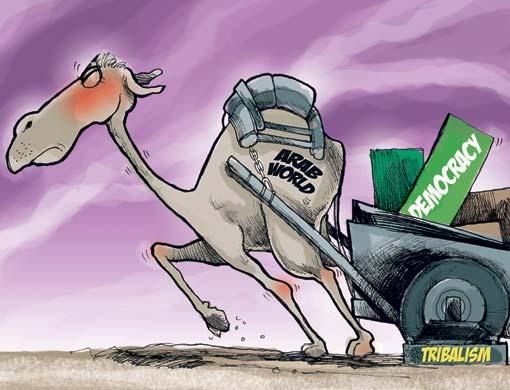For years, western academia has invoked religion and culture to explain the lack of democracy and the slow pace of change in the Arab world.
At times, comparisons were made to underline the supremacy of these factors in the life of Arabs and Muslims, rendering the impact of foreign influences almost irrelevant.
For instance, when Western academics tried to compare the application of "the modernisation theory" to the Middle East and Latin America and the possibility of democracy to become the norm in these two regions, Leonard Binder, a prominent US academic, noticed that whereas Western scholars who conducted such studies have concentrated on the socio-economic factors in the case of Latin America, in the Middle East, by contrast, the focus was on the "otherness" of the region and the resistant nature of its cultural heritage.
However, by way of reversing the effects of this view, Binder noticed that whereas Latin Americans were solely concerned about economic exploitation when opposing western penetration, the apprehension of Middle Easterners stemmed mainly from cultural penetration.
Answer
Other scholars such as Samuel Huntington, Amos Perlmutter and Elie Kedourie found the answer in the nature of Islam as to why democracy has not flourished in the Arab world.
Huntington believed that Islam was intrinsically un-democratic. The only Arab country to have experienced a sustainable form of democracy was "Christian Lebanon".
"Once Muslims became a majority", Huntington argued, "Lebanese democracy collapsed". Perlmutter held similar view and argued that particularly in the Middle East "democratic or even pluralistic regimes are unachievable".
Elie Kedourie in his argument relied heavily on the writings of medieval Muslim scholars, such as Al Ghazali, to explain why the Arab and Muslim world was lagging far behind the rest of the world in terms of "good governance".
Al Ghazali argued that stability under an autocratic ruler overweighs the chaos created by the tyranny of the people against each other.
A few have, in fact, noticed that Kedourie had ignored the counter argument presented by another medieval Muslim scholar: Ibn Taymiyya, who believed that revolt against a tyrannical ruler is an obligation on all Muslims.
Ironically, Kedourie was imitated by Middle Eastern regimes, who have always tried to highlight the thought of Al Ghazali, through the media, while ignoring Ibn Taymiyya's.
In recent years, however, and as a response to US difficulties in stabilising Iraq and establishing a flourishing democracy in Lebanon, a new tool of analysis has been employed.
The focus has shifted from Islam as a religion and culture to tribalism as a key component of Arab society and a major hindrance to political and social developments in the Arab world.
"Conflicts within the Middle East cannot be separated from its peoples' culture. Seventh-century Arab tribal culture influenced Islam and its adherents' attitudes toward non-Muslims.
"Today, the embodiment of Arab culture and tribalism within Islam impacts everything from family relations, to governance, to conflict. While many diplomats and analysts view the Arab-Israeli dispute and conflicts between Muslim and non-Muslim communities through the prism of political grievance, the roots of such conflicts lie as much in culture and Arab tribalism," Philip Carl Salzman wrote in the current issue of Middle East Quarterly.
Clearly, some scholars are trying to justify the failure of US policies in the Middle East and to exonerate the Bush administration from any responsibility in this regard. Islam is no longer a useful tool to explain why the project of promoting democracy in parts of region has failed.
The success of democracy in some Muslim countries such as Turkey and Indonesia has pulled the rug form under the feet of these apologetic scholars.
One should not be surprised, as a consequence, that tribalism has replaced Islam as the focus of Western experts on the Middle East. It is, therefore, very likely that studies on "tribalism" will draw significant attention in academic circles in the coming months and years.
Dr Marwan Kabalan is a lecturer in media and international relations, Faculty of Political Science and Media, Damascus University, Syria.











